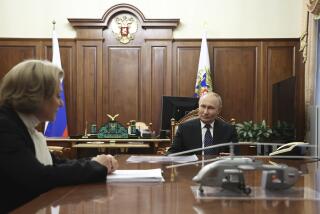Yeltsin Imposes State of Emergency as Battles Erupt in Southern Flank : Ethnic warfare: Russians, worried about the spread of violence in troubled Caucasus region, try to restore order.
- Share via
MOSCOW — In a rare display of common political resolve, Russian President Boris N. Yeltsin and increasingly hostile lawmakers joined forces Monday to impose a state of emergency to halt the first outbreak of ethnic warfare in the independent Russian Federation.
Under Yeltsin’s monthlong emergency decree, which took effect immediately, strikes and political actions were banned in troubled North Ossetia and the Ingush Republic. Deputy Prime Minister Georgy S. Khizha was put in charge of the minority enclaves north of the Caucasus Mountains.
Yeltsin said sternly that nothing less than Russia’s territorial integrity is at stake in the conflict; the Supreme Soviet, which has been at odds with him over the past weeks, gave him its prompt support.
Russian leaders have often voiced alarm at the likelihood that ethnic wars--now endemic to the Transcaucasus lands of Georgia, Armenia and Azerbaijan--could boil over into Russia proper.
Sure enough, in a territorial quarrel with roots deep in the brutal policy of dictator Josef Stalin, pitched battles broke out Friday between the Ingush and Ossetians in North Ossetia, which the Ingush say should belong in part to them. At least seven people were killed and scores of Russian servicemen were taken hostage in the rugged mountain region.
On Sunday, as an indication of how gravely Moscow views the bloodshed, thousands of paratroopers and Interior Ministry soldiers were airlifted in to separate the warring sides in Prigorodny, near the North Ossetian capital of Vladikavkaz.
“Militant nationalists have unleashed a direct armed attack on the constitutional order of Russia, its security and territorial integrity,” Yeltsin declared in a message to the troops, indicating he is determined to draw the line at allowing such problems to taint Russian soil. “The conflict between North Ossetia and Ingushetia has already led to the death of citizens. Those guilty must bear full responsibility in accordance with the law.”
At a special closed-door session of the Russian legislature, its members ratified the emergency decree, putting aside for the moment the deep political divisions that led them to defy Yeltsin last month and convene a session of the nation’s Congress of People’s Deputies for Dec. 1. That body is expected to try to halt or reverse Yeltsin’s entire reform agenda.
Under Yeltsin’s emergency decree, direct administration of the districts was stripped from elected local leaders and put temporarily into Moscow’s hands. Demonstrations and work stoppages are outlawed; firearms and knives will be temporarily confiscated from residents; newspapers and broadcast media will be censored.
It was harsh action without precedent under Yeltsin’s leadership, and Akhsarbek Galazov, chairman of the North Ossetia Parliament, objected that his land’s sovereignty had been violated.
But virtually all Russian leaders, who watched as the Soviet Union dissolved last year into its component republics, are acutely aware of the danger that the Russian Federation, itself honeycombed with minority homelands, could also suffer a meltdown along ethnic lines. And by late Monday, even North Ossetia’s Parliament voted overwhelmingly for Yeltsin’s decree.
The Itar-Tass news agency said fighting raged overnight in half a dozen settlements near Vladikavkaz, a city of 300,000, despite the Russian-brokered cease-fire that took force Sunday evening. Russian forces were said to have come under attack several times and returned fire.
Three cadets from a military academy in Vladikavkaz were killed and nine others wounded, news reports in Moscow said. An Interior Ministry spokesman said Ingush and Ossetians were battling with firearms and artillery, but the strife seemed to die as night fell.
The Interfax news agency said 100 Ingush had been killed, while the newspaper Izvestia estimated the overall death toll at 50. No authoritative figures were available.
Khizha directly blamed another Caucasus ethnic homeland, Chechenya, for supplying firearms that sparked the unrest. Chechens had lived in the same autonomous republic as the Ingush until last year. But the region declared unilateral independence from Russia and then split along ethnic lines.
Russia’s 100,000 Ingush, predominantly Muslim, demand the rectifying of what they call a historical wrong wrought by Soviet tyranny. In 1934, the Ingush Autonomous Republic was abolished and its Prigorodny district transferred to North Ossetia, whose local population is largely Orthodox Christian. In 1944, Stalin accused the Ingush of collaborating with the Nazis and deported them en masse to Siberia and Soviet Central Asia. The Ingush were allowed to return home only in 1957. A year ago, they demanded the return of Prigorodny.
More to Read
Sign up for Essential California
The most important California stories and recommendations in your inbox every morning.
You may occasionally receive promotional content from the Los Angeles Times.













